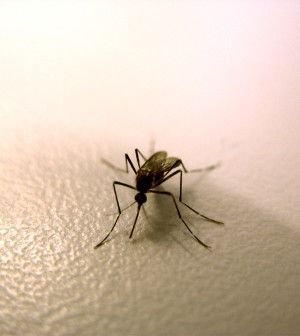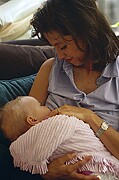- Could Your Grocery Store Meat Be Causing Recurring UTIs?
- Are You Making This Expensive Thermostat Error This Winter?
- Recognizing the Signs of Hypothyroidism
- 10 Strategies to Overcome Insomnia
- Could Artificial Sweeteners Be Aging the Brain Faster?
- Techniques for Soothing Your Nervous System
- Does the Water in Your House Smell Funny? Here’s Why
- Can a Daily Dose of Apple Cider Vinegar Actually Aid Weight Loss?
- 6 Health Beverages That Can Actually Spike Your Blood Sugar
- Treatment Options for Social Anxiety Disorder
Breast Milk May Protect Against Deadly Newborn Disease


A protein in breast milk that is not found in infant formula may protect newborns from a potentially deadly gastrointestinal disease, a new study suggests.
Breast milk contains the protein neuregulin-4 (NRG4), which can help prevent the intestinal damage caused by necrotizing enterocolitis (NEC), the researchers found.
Of all babies who develop NEC, 30 percent die from the condition, the researchers noted, and those that survive could face serious consequences, such as having part of their intestines removed or being dependent on IV nutrition.
“We’re finding a protective protein in breast milk, with its receptor in the intestine,” principal investigator, Mark Frey, from the Saban Research Institute of Children’s Hospital Los Angeles, said in a hospital news release. “Given that NEC is a significant clinical problem without an effective treatment, we plan to evaluate NRG4 for its therapeutic potential in this disease.”
While formula feeding is a known risk factor for NEC, researchers at Children’s Hospital Los Angeles found breast milk could protect babies against this serious condition.
“Our research suggests that without the NRG4 protein found in breast milk, a normal protection mechanism for the immature gut may be missing,” explained Frey, who is also an assistant professor of pediatrics and biochemistry and molecular biology at the Keck School of Medicine of the University of Southern California. “If a baby on formula encounters an NEC trigger, such as intestinal infection or injury, he or she may be at increased risk for a life-threatening condition.”
The research, published online Sept. 9 in the American Journal of Pathology, involved a series of animal studies as well as the examination of human breast milk and infant intestinal tissue in a lab.
Rats that were fed formula developed a condition similar to NEC. Rats that received formula plus the NRG4 protein, however, were protected against this intestinal damage. In addition, cultured intestinal cells put through similar conditions also showed they were protected when the protein was present.
The researchers concluded that NRG4 blocks inflammatory intestinal damage, prevents the loss of specialized cells that protect the intestine from damage and sustains intestinal stem cells needed for intestinal lining renewal.
More information
The U.S. Department of Health and Human Services provides more information on the heath benefits of breast milk.
Source: HealthDay
Copyright © 2026 HealthDay. All rights reserved.










